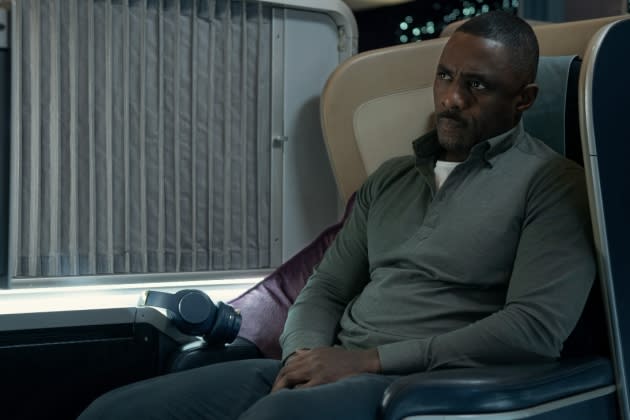‘Hijack’ Review: Idris Elba’s Apple TV+ Thriller Is No-Frills Fun

Were it not for, you know, its terror-at-35,000-feet concept, Apple TV+’s Hijack would be the TV equivalent of a classic plane read: slick, exciting, unfussy. As it stands, it’s ideal for a lazy weekend planted firmly on the couch. Creators George Kay (Lupin) and Jim Field Smith (Litvinenko) may not be pushing the bounds of the medium, nor is star Idris Elba elevating his craft to new heights. But there’s something to be said for a show that knows exactly what it wants to be, and pulls it off without pretension.
Its premise is as straightforward as its title. Unfolding in real time, 24-style, the seven-hour miniseries chronicles a seven-hour flight from Dubai to London. By the end of the first chapter, a small group of nefarious agents, led by the sneering Stuart (Neil Maskell), have taken control of the plane. Over the next six, the 200-plus passengers aboard figure out how best to survive the ordeal, while those on the ground — air traffic controllers, law enforcement officers, government officials and the like — piece together what’s happened, and figure out how to respond.
More from The Hollywood Reporter
Acclaimed Chinese Film 'Return to Dust' Set for U.S. Release (Exclusive Trailer)
'Gladiator' Russell Crowe Returns to Rome - as Expo Pitchman
Inside the Glorious - and Troubled - History of Italy's Taormina Film Festival
Throughout, Kay (who wrote or co-wrote all episodes) and Smith (who directed most of them) keep the tension at a delicious thrum. While a few of the more stereotypically thriller-y twists fall flat — like an unnecessary final showdown, or the anticlimactic reveal of the hijackers’ true motives — they excel at mapping the ever-shifting dynamics among those in the air, the crisis cascading among those down on earth, and the sparse communications between the two.
At the center of our perspective is Elba’s Sam Nelson, who, as his ex-wife (Christine Adams) explains to a concerned party back in London, is a negotiator specializing in corporate mergers and takeovers. “Sam’s the best at handling it,” she says, and between the somber music, the dramatic zoom-ins and the anxious looks she exchanges with their son (Jude Cudjoe), one might assume his job description is code for “mob boss” or “Avenger.” It isn’t — he really is just a guy who facilitates deals — but Hijack regards Sam’s people skills as a sort of superpower unto itself.
Though the events on Kingdom Airlines Flight 29 do sometimes come to physical blows, a 007 audition this isn’t. For Sam, fists are a last resort; his first and best weapon is conversation. He can talk a gate attendant into letting on a late passenger with a friendly shrug, as he does in the opening minutes of the premiere, or calm down a pair of fliers concocting an ill-advised plan to battle their captors with golf balls and seatbelts. His gift for listening and observing allows him to intuit when to cooperate with the hijackers and when to rally his fellow passengers.
With some actors, the idea that a basically normal businessman might be this innately persuasive could read as self-aggrandizing, even delusional. In Elba’s strong, steady hands, it becomes the simplest thing in the world to believe Sam is truly that charming. He plays Sam with the self-possession of a man who has nothing to prove to anyone.
None of the other characters get fleshed out to nearly the same degree. Most get to be in the thick of the action for a scene or an episode, before fading into the background. But Hijack sprinkles in enough bits of detail to suggest existences that extend far beyond the duration of the flight. Plot-irrelevant chitchat about a Dubai air traffic controller (Mohamed Faisal Mostafa) cooking up plans for his birthday makes it easier to root for his heroism when he refuses to ignore his suspicions, or to tense up when he follows them into grave danger. The seemingly random detail that a casualty was due to start a new job that week proves to be the sort that sticks with Zahra (Archie Panjabi), a counterterrorism officer in London, because it speaks to an entire life cut short.
Crucially, Hijack understands as well as Sam does that humans are complicated beasts. A fellow might talk a big game about the importance of hitting back at the presumed terrorists only to balk when he’s asked to put himself on the line, and then rise to the occasion when the chance comes by again. A religious leader pushed to make a rousing speech might not manage anything that memorable — and yet it might be just enough to convince a panicked mass to hang on a little while longer. A gun-toting hijacker might even prove himself to be human, when the fate of someone he truly loves hangs in the balance.
Despite a storyline that seems like it could yield all manner of heavy-handed commentary on crime or terrorism or international relations (again, 24-style), Hijack largely steers clear of hot-button topics. Despite the inherent intensity of the situation, the show rarely aims for big emotions beyond nail-biting stress. Despite ample opportunities to either venerate heroism or philosophize about the darkness at the heart of man, it tends toward neither sentimentality nor cynicism.
It’s here mostly to deliver on fun — and that it serves up in spades. In the final minutes of the series, a couple who’d spent their first minutes onscreen bickering over a piece of luggage find themselves, at the end of it all, bickering about the same piece of luggage all over again. It’s a funny beat, and oddly touching — apparently, the wild events of Hijack evidently haven’t changed their lives that much. They probably won’t change yours either. But they sure make for one entertaining ride in the meantime.
Best of The Hollywood Reporter